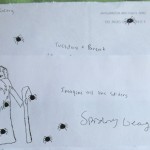Why do people have so much contempt for “the Friendzone”? Part of the problem is that we’ve defined romantic love as the highest form of emotional and physical intimacy, so missing out on dating feels like missing out on communion. At The American Conservative, I’m talking a little about this problem in “Our Starved for Touch Culture.”
In the wake of the Santa Barbara shootings, the unpleasant underbelly of the pickup artist community (PUA), involuntary celibates (incels), and other unhealthy refuges for lonely men have drawn scrutiny and condemnation. They describe themselves as exiles; in the case of the Isla Vista shooter, he decided to destroy the world he couldn’t enter, instead of building something new outside it.
Their sense of exclusion is exacerbated by the stories we tell about sex as a prize you can earn and the tendency of the media to shame sexual inexperience (The Daily Mail referred to the shooter as “The Virgin Killer,” implicitly agreeing that his sexual exploits, or lack thereof, defined him). It is also exacerbated by the stories we don’t tell about friendship and platonic love.
The friendzone is treated as a wasteland not just because we treat sex as an idol, but because friendship and non-sexual affection is written off as irrelevant. Casual dating has been replaced by casual sex; platonic touch has been eclipsed by erotic signalling. Pickup artists teach their pupils (not inaccurately) that taking someone’s hand, touching a shoulder, or even moving into one-on-one conversations are indications of interest, and a signal to keep escalating, in the hopes of transitioning to a hookup.
If affection is merely foreplay, then a person who isn’t having luck approaching people romantically is also cut off from most normal human comforts. That kind of isolation is tremendously harmful.
I don’t want to emphasize the importance of physical affection and friendship as just a response to violence. The despair of the Isla Vista shooter was outward directed, but it would still be worth salving if it was inward-directed, and didn’t pose a threat to anyone else. When the elderly are alone, we recognize isolation as a threat to their health and a neglect of full human flourishing, so, when we don’t have a better solution on hand, we give them little robotic pets to snuggle and care for.
But when teenagers and twentysomethings feel lonely, there’s less of a tendency to treat the desire to be held or to be cared for and care for someone in return as a serious desire. It’s written off as needing to be laid, or a natural part of growing up, and I’m not convinced that’s a true or healthful response.
So what can we do besides declare “A robotic harp seal in every pot!”
This feels like a “going to Abilene” problem, where some progress is made when people just talk about the issue and get the chance to notice we might all like to change our behavior together. Then we have a chance to make small, individual adjustments, and also to work together to change the culture and institutions that are misleading us. I’m also in the middle of an ARC of Eve Tushnet’s forthcoming book on vocation which is going to wind up being an important addition to this project.
It’s edge cases like the Isla Vista shooter that draw our attention back to the problem of loneliness and untouchability, but nearly everyone’s life could stand to be better on this spectrum. One comment on my article simply says,
I just got back from India, and what I miss the most is my family always being around, with a shoulder to lean my head against, or someone to braid my hair, or help me with a saree.
The absence of that particular affection doesn’t have to threaten to ruin anyone’s life to be worth protecting and promoting.
Today is the second day of my Novena to Mary, Undoer of Knots, and you’re welcome to join in.













